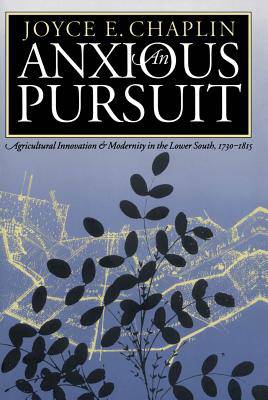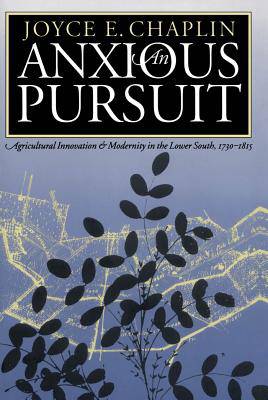
Door een staking bij bpost kan je online bestelling op dit moment iets langer onderweg zijn dan voorzien. Dringend iets nodig? Onze winkels ontvangen jou met open armen!
- Afhalen na 1 uur in een winkel met voorraad
- Gratis thuislevering in België vanaf € 30
- Ruim aanbod met 7 miljoen producten
Door een staking bij bpost kan je online bestelling op dit moment iets langer onderweg zijn dan voorzien. Dringend iets nodig? Onze winkels ontvangen jou met open armen!
- Afhalen na 1 uur in een winkel met voorraad
- Gratis thuislevering in België vanaf € 30
- Ruim aanbod met 7 miljoen producten
Zoeken
€ 57,95
+ 115 punten
Omschrijving
In An Anxious Pursuit, Joyce Chaplin examines the impact of the Enlightenment ideas of progress on the lives and minds of American planters in the colonial Lower South. She focuses particularly on the influence of Scottish notions of progress, tracing the extent to which planters in South Carolina, Georgia, and British East Florida perceived themselves as a modern, improving people. She reads developments in agricultural practice as indices of planters' desire for progress, and she demonstrates the central role played by slavery in their pursuit of modern life. By linking behavior and ideas, Chaplin has produced a work of cultural history that unites intellectual, social, and economic history.
Using public records as well as planters' and farmers' private papers, Chaplin examines innovations in rice, indigo, and cotton cultivation as a window through which to see planters' pursuit of a modern future. She demonstrates that planters actively sought to improve their society and economy even as they suffered a pervasive anxiety about the corrupting impact of progress and commerce. The basis for their accomplishments and the root of their anxieties, according the Chaplin, were the same: race-based chattel slavery. Slaves provied the labor necessary to attain planters' vision of the modern, but the institution ultimately limited the Lower South's ability to compete in the contemporary world.
Indeed, whites continued to wonder whether their innovations, some of them defied by slaves, truly improved the region. Chaplin argues that these apprehensions prefigured the antimodern stance of the antebellum period, but she contends that they were as much a reflection of the doubt inherent in theories of progress as an outright rejection of those ideas.
Using public records as well as planters' and farmers' private papers, Chaplin examines innovations in rice, indigo, and cotton cultivation as a window through which to see planters' pursuit of a modern future. She demonstrates that planters actively sought to improve their society and economy even as they suffered a pervasive anxiety about the corrupting impact of progress and commerce. The basis for their accomplishments and the root of their anxieties, according the Chaplin, were the same: race-based chattel slavery. Slaves provied the labor necessary to attain planters' vision of the modern, but the institution ultimately limited the Lower South's ability to compete in the contemporary world.
Indeed, whites continued to wonder whether their innovations, some of them defied by slaves, truly improved the region. Chaplin argues that these apprehensions prefigured the antimodern stance of the antebellum period, but she contends that they were as much a reflection of the doubt inherent in theories of progress as an outright rejection of those ideas.
Specificaties
Betrokkenen
- Auteur(s):
- Uitgeverij:
Inhoud
- Aantal bladzijden:
- 430
- Taal:
- Engels
- Reeks:
Eigenschappen
- Productcode (EAN):
- 9780807846131
- Verschijningsdatum:
- 9/09/1996
- Uitvoering:
- Paperback
- Formaat:
- Trade paperback (VS)
- Afmetingen:
- 157 mm x 235 mm
- Gewicht:
- 671 g

Alleen bij Standaard Boekhandel
+ 115 punten op je klantenkaart van Standaard Boekhandel
Beoordelingen
We publiceren alleen reviews die voldoen aan de voorwaarden voor reviews. Bekijk onze voorwaarden voor reviews.











